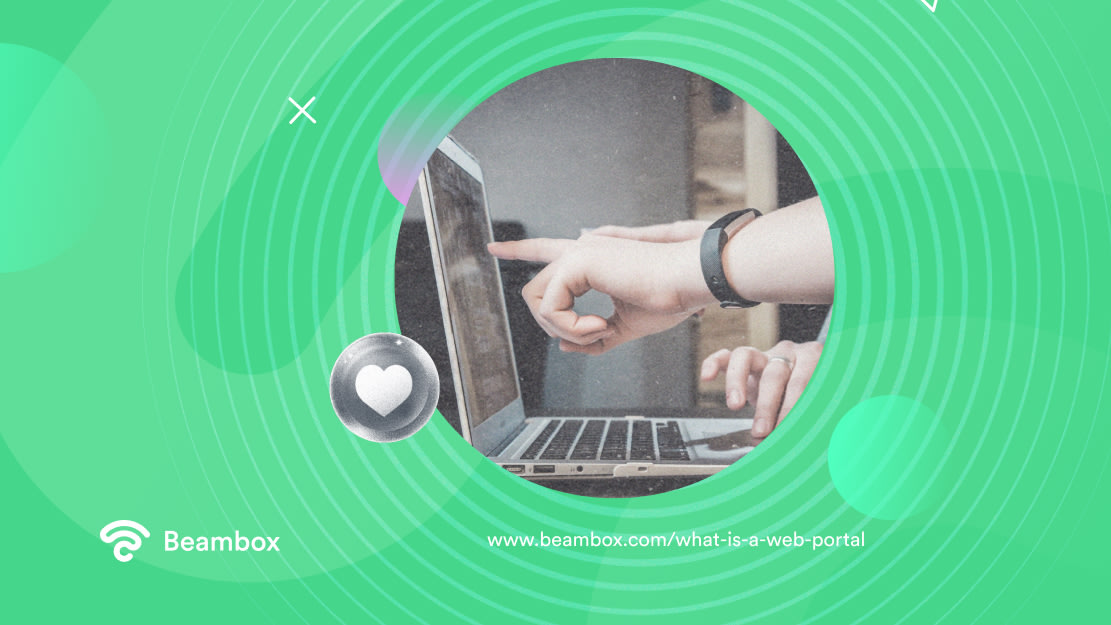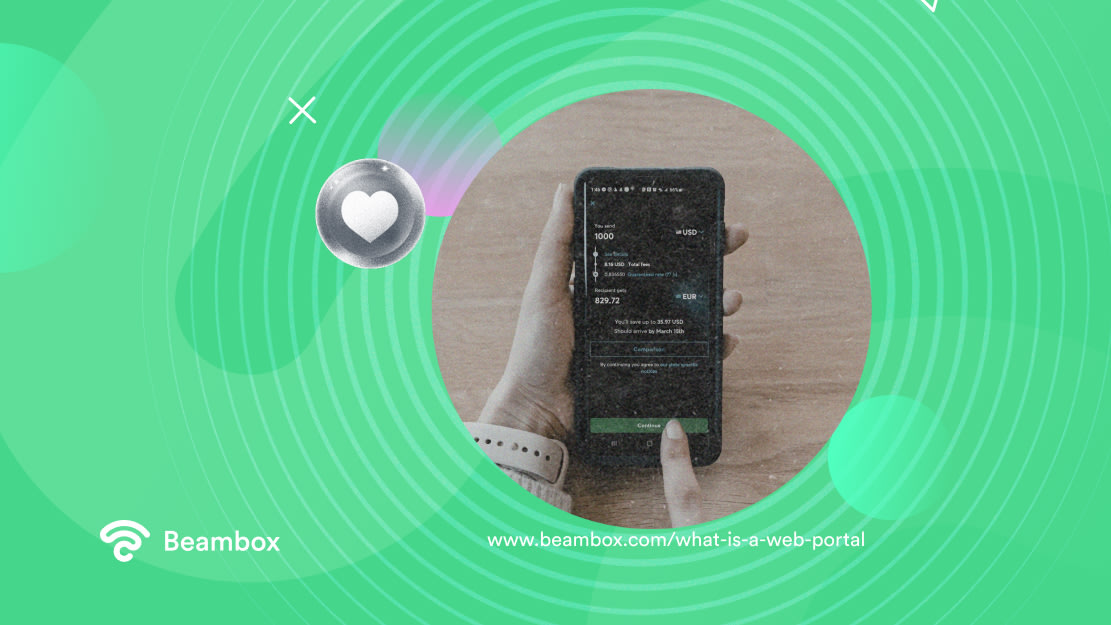What Is a Web Portal: Introduction, Benefits, and Examples
Keeping your customers informed at all times while facilitating smooth collaboration is the best way to win them over. Apart from customers, your employees and other business stakeholders also need certain information and resources to keep the business running. For that, a relevant web portal might be your best shot. But what is a web portal?
It’s a web gateway that helps you provide content access through a user-friendly interface to the people who need it. Depending on the type, it also lets you effectively collaborate with customers, employees, and suppliers.
But that isn’t the end of the perks that web or captive portals offer. So, if you want to know more about these web systems, you’ve reached the perfect place.
We’ll start by defining web portals and discussing their benefits for businesses. Then, we’ll move on to some examples to help you choose the one that fits your needs. So, without further ado, let’s begin!

What Is a Web Portal?
A web portal is a web-based platform that lets users access information and services from a central online location. After all, you wouldn’t want to present your customers with a different source link whenever they ask for something. So, how does a web portal work?
It works by collecting data from multiple sources and presenting it in a user-friendly manner.
It usually asks users to enter their captive portal login credentials before they can see the information. This way, you can set access controls and only show the data relevant to the particular user. For example, if it’s a customer portal, users will only see information about their orders and accounts.
Some portals even let users customize how they see the information. These features make it possible for you to provide a personalized experience when sharing information.
Moreover, they allow you to integrate various business tools and services. For instance, you can let customers buy directly through the portal with an online shopping feature.
However, classification is another thing to keep in mind after learning the answer to “What is a web portal?” So, let’s explore the vertical and horizontal kinds of web portals in detail.
A vertical web portal is a specialized portal that caters to a specific industry, niche, or area of interest. In simpler terms, it covers all aspects of a particular industry, such as health. A good example would be Healthline, which provides health news, medical information, and community forums for patients.
On the other hand, horizontal web portals act as a broad gateway to the Internet. Consider these as general-purpose starting points for users with diverse interests, such as Google. It lets you search for anything you want in any industry you want.

Top 5 Reasons Why Every Company Should Use Web Portals
Let’s take this discussion further and examine the benefits now that you’re familiar with the concept of web portals.
The following five reasons why every company should use web portals might help you make up your mind about them:
- Efficient communication: With the availability of chatbots, forums, and information sources, you won’t have to face any communication issues. Remember, good communication is the best course of action to keep your customers, employees, and suppliers happy.
- Employee productivity: Instead of relying on meetings and other sources of information, employees can log into their portal. Moreover, when customers have all the information they need, your employees can use their time better.
- Customer service: With constant access to information and services, customers won’t have to contact you when facing a problem. This will enhance their experience.
- Customer loyalty: Not waiting for a solution will make customers loyal to your business. In return, you’ll have better revenue and profits.
- Cost reduction: Web portals allow you to automate some business tasks, such as information distribution and support. Therefore, you can perform well with a limited workforce, reducing your costs.
6 Web Portals Examples That Meet Various Needs
When it comes to web portals, you must tread carefully because different types of portals cater to different needs. If you end up choosing the wrong portal, you might miss out on the features you need for your business. For example, a patient portal won’t work for you if you belong to the construction industry.
So, the next few sections will discuss six web portals examples to help you choose. Pay close attention to what each one does and make a decision accordingly.

1. Employee Portals Improve Business Efficiency
Since the beginning of this discussion, we’ve been discussing the benefits web portals provide to employees. However, for those benefits to become a reality, you must incorporate an employee portal, which is the first example.
The business’s HR department uses these portals to train new employees and keep the old ones updated. Moreover, you can ask employees to upload their performance information. For example, a restaurant might ask servers to make an entry every time they secure an order. This could help improve restaurant sales.
Another name for this type of portal is “intranet.” That’s because sometimes, these are only available through a private network. The intranet keeps the company’s information safe from external parties.
2. Vendor Portals Keep Track of Your Purchases
Another stakeholder that almost every business has is a vendor or supplier. Some businesses might even have more than one vendor. If that’s the case with your business, you must consider using a vendor portal.
These portals allow you to effectively communicate with all your suppliers and keep track of your orders. This means you’ll have everything from invoices to payment information at your fingertips.
You can also submit relevant documents and, sometimes, make payments online. With these features, a vendor portal makes maintaining healthy relationships with your suppliers easier.

3. Patient Portals Facilitate Healthcare Access and Engagement
Next, we have patient portals that let patients access all their information in one place. They don’t have to visit the hospital every time for their medical history, appointments, test results, or medications.
Like other web portals, patients can effectively communicate with their doctors without waiting for an appointment. This way, they’re able to clear their doubts from the comfort of their homes. Some of these portals even let patients make appointments online, which adds to their experience.
4. Government Portals Empowers Citizens
Another example of a web portal is a government portal that plays a vital role in empowering citizens. They can access important information such as taxation, government guidelines, immigration, etc.
Apart from regular citizens, these portals also help businesses comply with the guidelines. For example, a person looking to start a business can find information on registering their new company.
Similarly, businesses and people facing legal issues can refer to government portals to shape their approach. Successful examples of these portals are Data.gov and Bloomberg Government.

5. Banking Portals Promote Effective Financial Management
Banking portals are one of the most common types of portals that people use on a daily basis. They allow authorized users to make secure transactions, pay utility bills, etc.
Moreover, they sometimes let users automate recurring payments so they never have to pay extra dues. These features of a banking portal facilitate effective financial management.
These portals are also always up-to-date with the latest banking information and forms. This way, people don’t have to visit banks for common tasks.
6. Customer Portals Enhance Customer Experience
Let’s end this list with customer portals that work wonders to provide exceptional customer experience.
As mentioned earlier, you can provide customers with updated information and keep them in the loop. Moreover, you can store customer information, such as names, demographics, and preferences, from when they create an account. Best of all, captive portal optimization will help you create better marketing campaigns.
In addition, customer portals allow you to integrate forms and surveys. You can ask customers to review their experience with your business and use that information to make improvements.
However, if information gathering is the only goal, you can consider implementing a captive portal. This web page authenticates users by asking them for details, like their names and email addresses. But for this to work, you’ll have to offer a free WiFi hotspot in your venue.

Web Portals Provide an Upper Hand That Every Business Needs
So, what is a web portal? It ultimately takes data from multiple sources, combines it, and presents it in a consistent, user-friendly manner. Captive portal software brings access, convenience, and efficiency.
Our platform, Beambox, helps you create custom captive portals for authentication and allows you to collect customer data.
Additionally, with the same platform, you can run effective marketing campaigns with just a few clicks. Thousands of businesses use Beambox to scale and simplify their marketing operations. Want to join them? Start your Beambox 30-day free trial!
Get Started With Free WiFi Marketing
Beambox helps businesses like yours grow with data capture, marketing automation and reputation management.
Sign up for 30 days free


